|
|
|
Sort Order |
|
|
|
Items / Page
|
|
|
|
|
|
|
| Srl | Item |
| 1 |
ID:
123537
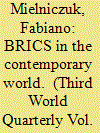

|
|
|
|
|
| Publication |
2013.
|
| Summary/Abstract |
This paper aims to address the reasons why the acronym brics is moving from being an easy marker to guide foreign investors interested in emerging markets to denoting an important political group of countries determined to promote major changes in international relations. Theoretically the paper draws on social constructivism to demonstrate that the changing identities of brics (Brazil, Russia, India, China and South Africa) can be treated as the main cause of the convergence of their interests in the international arena. Through a detailed analysis of these countries' statements at the opening sessions of the UN General Assembly from 1991 to 2011, their social claims about themselves are retraced and the way they have judged the international sphere in which they engage is captured, in order to demonstrate the changing character of their identities. These new identities, it is argued, created the opportunity for converging interests, which explains the emerging political structure of brics . The paper concludes that, after four major summits and a significant number of wide-ranging low-level meetings, brics might be considered one of the major long-lasting forces shaping the new architecture of international relations in the 21st century.
|
|
|
|
|
|
|
|
|
|
|
|
|
|
|
|
| 2 |
ID:
123538


|
|
|
|
|
| Publication |
2013.
|
| Summary/Abstract |
South-South cooperation is assumed to reflect a deep attitude of solidarity among nations of the global South. We point out that, although India, Brazil and South Africa (ibsa) present themselves as being in the vanguard of South-South cooperation, their foreign economic policies make such solidarity somewhat thin. We focus on examples in which these three states deliberately but also unintentionally create sub-optimal conditions for the development of some of their Southern neighbours. This outcome reflects the policies that emerging centres of accumulation in the South are promoting, as well as the material interests of the dominant class alliances in the aforementioned states. There is a need for close scrutiny of the foreign economic policies of dynamic developing economies, and for closer multilateral coordination among the states of the global South.
|
|
|
|
|
|
|
|
|
|
|
|
|
|
|
|
| 3 |
ID:
123536
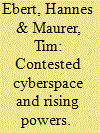

|
|
|
|
|
| Publication |
2013.
|
| Summary/Abstract |
The USA developed and has therefore historically played a lead role in cyberspace. Yet rising powers, including brics , have been increasingly challenging the established regime. China and Russia submitted a joint proposal on information security to the United Nations in 2011. India, Brazil, and South Africa have been focusing on the information society since their 2003 Brasilia Declaration. These initiatives demonstrate that cyberspace has become hotly contested. However, there is still a need to explain this divergence. Are rising powers challenging the USA because of their national interests, the urge to maximise their security, or do factors such as values and political structures explain the different trajectories vis-à-vis the hegemon? This article examines the foreign policies of brics from 1995 to date, explaining the influence of different path-dependent origins, of the systemic shift and the type of political system, together with rising civil society pressure.
|
|
|
|
|
|
|
|
|
|
|
|
|
|
|
|
| 4 |
ID:
123530
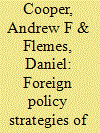

|
|
|
|
|
| Publication |
2013.
|
| Summary/Abstract |
This Introductory Review examines the major debates concerning the rise of emerging powers in the global system. It points to the fundamental difference between the contours of ascendancy in the first quarter of the twenty-first century from previous historical eras with reference to the number of countries placed in this category, the privileging of economic dimensions of power, and the much more elaborate and open levels with regard to institutionalization. Ample attention is paid to the BRICS, but consistent with the image of multipolarity, it also gives some emphasis to the question of whether the changing global system provides enhanced space for middle powers. After highlighting these highly relevant contextual considerations, the core of the Review moves to an analysis centred on more specific puzzles about the foreign policy strategies of emerging powers. One major puzzle is whether the preference of rising states is to work through established institutions or to utilize parallel and/or competitive mechanisms. Another concerns the balance between material interests, status-enhancement, and identity issues as motivators for policy preferences. Still another focuses on the degree to which China should be differentiated from the other BRICS, or indeed whether the BRICS share values such as a common politics of resentment or want to differentiate themselves on a normative-oriented basis in alterative groupings such as IBSA. A more sophisticated awareness of the limitations as well as of the capacities of the BRICS - with an appreciation of the intricate mix of concerns about solidarity and sovereignty, as well as conceptual tensions between realism and complex interdependence - is not only important for assessing the future trajectory of the BRICS role in the world, but in locating space for categories of countries such as middle powers. The major puzzle for middle powers is whether or not they will be able to mobilize attributes, notably the leveraging of 'network power', that provide them with comparative advantage. Although in overall terms the global system has not progressed towards multipolarity in a linear fashion underwritten by alternative actors, it is precisely due to this imprecision - and level of academic and operational contestation - that the articles assembled in this Special Issue have such salience.
|
|
|
|
|
|
|
|
|
|
|
|
|
|
|
|
| 5 |
ID:
123533
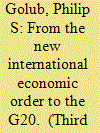

|
|
|
|
|
| Publication |
2013.
|
| Summary/Abstract |
In the early 1970s the G77 and the Non Aligned Movement ( nam ) challenged the material and intellectual pillars of the postwar liberal capitalist system through collective action at the UN to establish a New International Economic Order ( nieo ). The aim was to complete the 'emancipation' of the 'global South' by creating binding institutional frameworks, legal regimes and redistributive mechanisms correcting historically constructed core-periphery disparities. That ambitious effort failed in the face of 'Northern' resistance and national segmentation within the nam . Today re-emerging states of the global South are engaged in a more successful effort to gain voice and alter international hierarchy by claiming a central place in the world capitalist system and restructuring it from within. The vertical late-modern world system centred in the Atlantic and ordered by the 'West' is thus gradually giving way to a polycentric international structure in which new regional and transnational 'South-South' linkages are being formed. This paper critically reviews the transformation and argues that, while it is creating long sought-for conditions of relative international equality, it has also dampened the emancipatory promise of the anti-colonial struggle.
|
|
|
|
|
|
|
|
|
|
|
|
|
|
|
|
| 6 |
ID:
123535
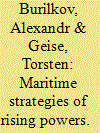

|
|
|
|
|
| Publication |
2013.
|
| Summary/Abstract |
This paper seeks to uncover the drivers of maritime strategy formulation in Russia and China, two active players on the international stage that have often been identified as both rising and regional powers. The paper takes as its starting point the realist theory of state power and threat perception, which provide the means and motivation for states to accumulate material capabilities in an effort to safeguard their position in the international system. Given the increasing pressures of a changing security environment, China's and Russia's maritime strategies show a trend towards greater complexity and capability. The paper also addresses the impact of the revolution in military affairs ( rma ) and its subsequent manifestation as force transformation in Western states, especially the USA. Given that this new, qualitatively focused way of war has gained supremacy, at least where high-intensity inter-state war is concerned, the question remains of whether the Chinese and Russians will choose to emulate the leading powers in the system or, instead, will forge into the unknown and formulate an entirely different and innovative maritime strategy.
|
|
|
|
|
|
|
|
|
|
|
|
|
|
|
|
| 7 |
ID:
123532


|
|
|
|
|
| Publication |
2013.
|
| Summary/Abstract |
This article compares and evaluates the contributions of middle range powers to global governance initiatives. Examining participation in terms of personnel, financial and ideational contributions, we test several hypotheses derived from neorealism, critical theory, liberalism, constructivism, and post-internationalism against six cases: Canada, Japan, China, Russia, India and Brazil. We find that material power has a negative impact on contributions, while a country's leadership's attitude towards the international order, the length of its membership in major international organisations and the strength of its civil society all seem to have positive effects on its participation in global governance. Trade dependence, however, does not seem to exhibit the expected impact. The article indicates that multiple theoretical approaches may prove useful for evaluating the behaviour of middle range powers, and that further research should be conducted on the relative importance of each of the factors mentioned above in explaining middle range power contributions to global governance.
|
|
|
|
|
|
|
|
|
|
|
|
|
|
|
|
| 8 |
ID:
123534


|
|
|
|
|
| Publication |
2013.
|
| Summary/Abstract |
The multipolarity of the 21st century is fundamentally different from that of its harbingers because in the past decade change and innovation have been induced through sites of negotiation and by the establishment of intergovernmental foreign policy networks. New powers like Brazil, China and India have gained relative weight thanks to their status as agenda setters, brokers and coalition builders. This paper examines the relevance of different foreign policy networks such as India-Brazil-South Africa ( ibsa ) and Brazil-South Africa-India-China ( basic ) for their strategic approaches and argues that they are crucial vehicles for their ascension. Drawing on the work of Hafner-Burton et al, who raised the question of how states increase their power by enhancing their network positions, a typology of foreign policy networks is proposed: mediation, advocacy and substitution networks play important roles in today's shifting global order. The paper analyses how the different network types work together and how particular states have adapted better to the new environment than others.
|
|
|
|
|
|
|
|
|
|
|
|
|
|
|
|
| 9 |
ID:
123540
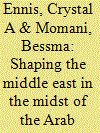

|
|
|
|
|
| Publication |
2013.
|
| Summary/Abstract |
While the Middle East and North Africa ( mena ) are undergoing rapid change, many domestic, regional and international actors are vying for space and influence as systems and customs evolve and adopt new forms. This paper characterises and compares the evolving foreign policy strategies of two such regional actors, Turkey and Saudi Arabia. It further assesses the motivations and activities of and challenges to Turkish and Saudi involvement throughout the region since the Arab uprisings. Ultimately these cases provide intriguing insight into the foreign policy purpose and methods of emerging states under conditions of uncertainty.
|
|
|
|
|
|
|
|
|
|
|
|
|
|
|
|
| 10 |
ID:
123531


|
|
|
|
|
| Publication |
2013.
|
| Summary/Abstract |
If global affairs are, indeed, moving towards a multipolar system, in which power coalesces around a small number of dominant poles (USA/EU/brics in the global South), then middle powers may well find themselves relegated to a subordinate role. Yet, at odds with this expectation, the role of particular traditional and non-traditional middle powers has become revitalised. This is in large part because of the nature of the global order after unipolarity under US dominance. Unlike past moments of transition, the current reconfiguration has not been made explicit by violent disruption. Moreover, unlike past concerts of powers, select middle powers have gained access to the G20, the hub site of transition in global governance. Membership in the G20 facilitates agency in terms of issue-specific forms of policy leadership, although the mode of operation by middle powers in utilising this space differs from country to country, as illustrated by the cases of Canada and South Korea.
|
|
|
|
|
|
|
|
|
|
|
|
|
|
|
|
| 11 |
ID:
123539
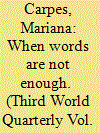

|
|
|
|
|
| Publication |
2013.
|
| Summary/Abstract |
This paper seeks to assess whether there is a contradiction between the commitment to non-proliferation declared by Brazil;India and South Africa and their domestic nuclear choices. Despite differences in their international nuclear status;these countries share similar commitments to non-proliferation;at least discursively. However;once the domestic level-more specifically;the historical characteristics of each of these countries' nuclear paths-is taken into account;a contradiction between their international discourse and their national interests seems to arise. By analysing their nuclear history;this paper asks the following questions: how much have these countries actually been doing in terms of non-proliferation? What are the aims of these countries' domestic nuclear politics? Is there any contradiction between their international nuclear discourse and their domestic practices?
|
|
|
|
|
|
|
|
|
|
|
|
|
|
|
|
|
|
|
|
|